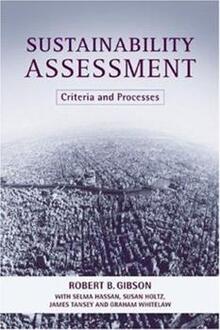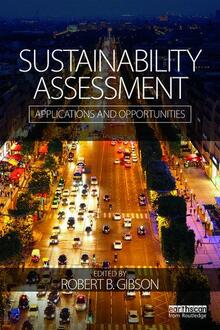
Sustainability Assessment: Criteria and Processes

Robert B. Gibson with Selma Hassan, Susan Holtz, James Tansey and Graham Whitelaw
London: Earthscan
2005, 268 pages
ISBN: 9781844070510
Sustainability assessment is now emerging as a more transparent, comprehensive, integrated and far-sighted approach to decision making. Its basic demand is that all significant undertakings must make a positive contribution to sustainability.
To apply this test, decision makers need criteria based on the core requirements of sustainability and the particularities of the context. As well, they need
- appropriately designed public processes
- guidance on the weighing of alternatives, trade-offs and compromises
- a supportive policy framework
- suitable tools and
- inspiring examples.
Drawing from transdisciplinary theory and practical case experience, the book addresses these matters and many of the surrounding controversies. While sustainability assessment must always be adjusted to particular circumstances, the generic approach set out in this book is applicable virtually anywhere.
Sustainability Assessment: Applications and Opportunities

Robert B. Gibson, editor
London: Earthscan/Routledge
2017, 282 pages
ISBN: 978113880275-9 (pb); 978131575404-8 (ebk)
Current and expanding human activities are moving us towards ever deeper unsustainability. While there is no single, simple means of reversing the invidious biophysical trends and redirecting the distribution of benefits, one necessary step is to approach every new and renewed undertaking as an opportunity to deliver maximum multiple, mutually reinforcing, fairly distributed and lasting gains. Finding the best options for enhancing such gains by comparing alternatives, addressing all the key requirements for progress towards sustainability and avoiding significant adverse effects, is the essential purpose of sustainability assessment.
This book addresses the theory and practice of sustainability assessment applications, drawing from experiences globally in a variety of sectors and presenting lessons learned. Diverse international case studies from professionals and academics demonstrate progress so far in exploring openings, testing approaches to application and establishing best practice. The book illustrates means of specifying generic sustainability criteria for the context of particular applications, reports on the resulting insights, and examines the barriers and opportunities for further advances.